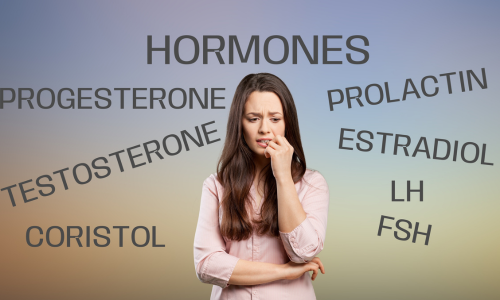Living Life in Full Color: Keys to Balanced Hormones
October 26, 2023

Hormones are crucial to many important functions in our bodies but can often be misunderstood. Although an imbalance can cause a variety of health issues, they are not the “bad guys” they are usually made out to be! Hormones are tiny but powerful chemicals that are made by glands and act as messengers. There are over fifty hormones produced in our body, mostly by the endocrine system, and they each have a specific purpose. They tell our cells how to act according to specialized functions of the system where they are produced or delivered. For example, insulin is made in the pancreas and its purpose is to lower blood sugar levels. Men and women have hormones in common but several of them vary according to level, function and where they are originally produced. For the purpose of this article, we are going to cover hormonal topics related specifically to women.

While hormones in women naturally fluctuate during puberty, pregnancy and menopause, they are present in far more areas than just our reproductive system. They don’t require much attention to function properly but can cause a variety of issues when our bodies are unable to regulate them as needed. Below are symptoms that can occur as a result of imbalanced hormones:
- Fatigue or exhaustion
- Trouble sleeping
- Changes in appetite
- Mood swings
- Thinning hair
- Hot flashes and/or night sweats
- Lack/loss of interest in sexual activity
- Vaginal dryness or discomfort
- Bloating or Weight changes, decrease in metabolism
- Dry or itchy skin
- Blood sugar issues, decreased or increased appetite
- Joint pain
As we grow older, hormones naturally increase or decrease. Leading a healthy lifestyle can be helpful in minimizing symptoms or discomfort but these fluctuations are unavoidable. Our body undergoes various hormonal changes that can impact our physical and emotional well-being. One of the most significant hormonal changes associated with aging is the decline in estrogen and testosterone production. In women, this decline typically occurs during menopause, which can cause symptoms such as hot flashes, vaginal dryness, weight gain and changes in mood.
Stress is related to hormonal changes in both positive and negative ways. The two main stress hormones are adrenaline and cortisol. Adrenaline is the hormone responsible for the "fight or flight" response. It increases heart rate, blood pressure, and respiration, preparing the body for physical activity. While adrenaline can be helpful in short bursts, prolonged exposure can lead to anxiety, high blood pressure, and other health problems. Cortisol helps to regulate blood sugar levels, blood pressure, and the immune system. However, prolonged exposure to cortisol can have negative effects, such as weight gain, weakened immune system, and increased risk of chronic diseases such as diabetes and heart disease.
Menopause is a time of a major shift in hormones as estrogen begins to decrease. There are three phases known as perimenopause, menopause and postmenopause and this transition typically begins around age fifty. This happens as menstrual cycles become less frequent and eventually cease to happen as our body’s biology determines we no longer need to reproduce. The level of severity that a woman experiences may vary but are commonly reported as mood shifts, drop in energy levels, hot flashes, night sweats and weight gain.
A strong link has been established between hormones and autoimmune diseases. An imbalance can not only contribute to the onset of autoimmune diseases but the diseases themselves can cause hormone imbalance and insufficiency. Hyperthyroidism, Lupus and Multiple Sclerosis are a few of the common autoimmune diseases interconnected with hormone fluctuations. Symptoms can be mild and progress slowly over years so monitoring hormone levels as part of our healthcare routine can be helpful in managing issues before they become severe.
The symptoms and causes listed above can overlap and lead to confusion when trying to find solutions. There are several resources for finding help with your specific combination of symptoms. Hormone testing is an excellent place to begin. Your healthcare provider should be able to offer these or provide a referral or prescription. There are also a variety of home-testing kits available to buy online as well. If your symptoms include weight gain, you may consider connecting with a local MRC Team to learn more about the Hormone Imbalance testing and rebalancing services we offer through Metabolic Research Center locations. Click here to take our Hormone Imbalance Quiz and connect with a local MRC Team.

No matter the reason for hormonal issues, there are some ways to help alleviate some symptoms. Adjustments to our daily habits may be necessary for this to happen. Hydration is important for many bodily functions and can help with proper circulation, detoxification and regulating body temperature. Being dehydrated can prevent the endocrine system from being able to communicate with our cells, tissues and organs. Getting adequate sleep is also important for our bodies to maintain proper levels of melatonin and cortisol. While sleep problems may seem like a difficult cycle to break once it begins, there are a few things we can do during the day to help our sleep patterns at night. Eliminating caffeine, or at least limiting it to earlier in the day, can make it easier to fall asleep in the evening. Replacing mind-stimulating activities, such as watching the news, intense movies or scrolling social media, with more calming choices like reading, meditation or restorative yoga can also be helpful.
Making healthier food choices is another way to support our overall well-being. It’s no longer enough to just avoid fast food and processed sugars, we need to be conscious of the ingredients in our food itself. Many recent studies are revealing how disruptive preservatives, dyes and other additives can be to our hormones. It can be challenging to make so many changes at once, especially when it impacts multiple choices on a daily basis. If you feel overwhelmed by this, choose one area such as sleep, stress and water intake to make changes then move onto the next issues. Food can be daunting so if making major shifts all at once is difficult, simply begin by making healthier choices as you replace foods each time you shop for groceries. Each change may not solve all your problems that symptoms may bring but that can help move you in the right direction. We can’t live without hormones but there are many resources and multiple ways to help us live with them.